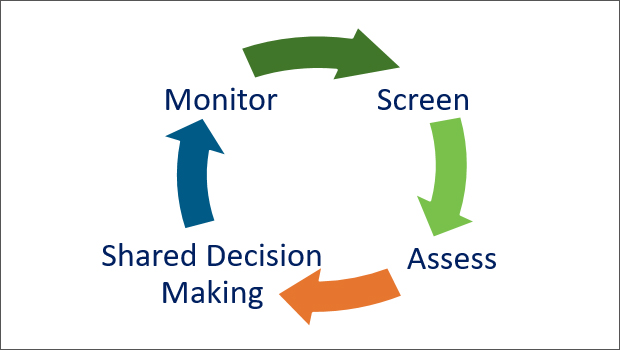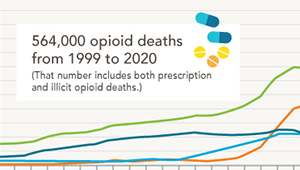Addictions
Research overview
Kaiser Permanente Washington researchers are exploring how to improve prevention and treatment of health issues due to alcohol and other drug use. The addictions research group conducts innovative research to help patients and their providers prevent and treat problems caused by alcohol, cannabis, opioids, and other drugs in health settings.
A major focus of the addictions research group is how to integrate patient-centered care for alcohol and other drug use into medical settings. For more than 3 decades, their work has focused on the need for health systems to routinely measure and address alcohol and other drug use as part of whole-person health, in nonjudgmental, patient-centered ways.
"Our alcohol-related research has built tools — such as a brief video, handout, and a patient decision aid — that help overcome stigma so that patients and families can find the help they want and need," said Katharine A. Bradley, MD, MPH, a senior investigator at Kaiser Permanente Washington Health Research Institute (KPWHRI) and internal medicine physician with Washington Permanente Medical Group.
The addictions research group is conducting a variety of studies to improve measures and documentation of substance use in the medical record. "We are working to find ways to easily document the extent of cannabis exposure for both medical and nonmedical use in electronic health records," said Gwen Lapham, PhD, MSW, a KPWHRI assistant investigator. Finding innovative ways to provide treatment is also a focus. "We are testing how to get proven online treatments for addiction into the hands of patients who could benefit," said Joseph E. Glass, PhD, MSW, a KPWHRI associate investigator whose research at the institute is funded in part by an early-career award to study the effectiveness of treatments for alcohol use disorders in primary care.
These are among the group’s current studies:
- PRimary Care Opioid Use Disorders (PROUD) is an implementation trial testing collaborative care for opioid use disorders.
- Digital Treatments for Substance Use Disorder (DIGITS) is a trial of strategies to implement online substance use disorder treatments into primary care.
- The DIGITS Equity trial is evaluating strategies to improve equity in the use of online treatments for substance use disorders among patients.
- The More Individualized Care: Assessment and Recovery through Engagement (MI-CARE) study is a pragmatic trial testing the effectiveness of a primary care collaborative care program for co-occurring opioid use disorder and depression.
- Dr. Bradley and Associate Biostatistics Investigator Jennifer F. Bobb, PhD — in collaboration with KPWHRI affiliate Kevin Hallgren, PhD, at the University of Washington — are demonstrating the psychometric validity and reliability of a DSM-5 Alcohol Symptom Checklist and Substance Use Symptom Checklist — practical tools for primary care.
- Associate Investigator David S. Carrell, PhD, is leading the Implementing Routine Screening for Cannabis and Other Drug Use Disorders in Primary Care study. Funded by the National Institute on Drug Abuse, this randomized pragmatic trial is evaluating the impact of screening on drug use disorder diagnosis and treatment in 22 Kaiser Permanente Washington clinics.
These are among the studies that the addictions research group has completed:
- The Sustained Patient-centered Alcohol-related Care (SPARC) trial found that implementing integrated mental health in primary care improved sustained implementation of evidence-based alcohol-related care.
- The Medical Cannabis Study explored patterns of medical cannabis use among primary care patients through electronic health record (EHR) and survey data.
- Dr. Lapham partnered with Kaiser Permanente Washington Mental Health and Wellness leaders to design and pilot implementation of evidence-based care for substance use into adolescent primary care.
- In collaboration with Emily Williams, PhD, MPH, a KPWHRI affiliate investigator at Veterans Affairs Puget Sound Health Care System, KPWHRI researchers found that patients with unhealthy alcohol use who had HIV were less likely to receive evidence-based alcohol-related care than those without HIV.
- The Choosing Healthier Drinking Options in Primary Care (CHOICE) trial found that, with nurse care management, collaborative care for patients with high-risk drinking raised their engagement in alcohol-related care — but did not decrease heavy drinking or related problems. However, usual care may have had benefits for patients with high-risk drinking but without symptoms of alcohol use disorders.
- The Options study developed a patient-centered decision aid for thinking about drinking and learning about options for making changes in drinking. This is now provided as a resource by the National Institute on Alcohol Abuse and Alcoholism in its Core Curriculum for medical providers.
Sparc trial tools
Resources for behavioral health integration
The SPARC trial successfully implemented behavioral health care into primary care. On our website, you can access tools for behavioral health integration, as well as frequently asked questions and publications.
Recent Publications on Addictions
Sayre M, Lapham GT, Lee AK, Oliver M, Bobb JF, Caldeiro RM, Bradley KA. Routine Assessment of Symptoms of Substance Use Disorders in Primary Care: Prevalence and Severity of Reported Symptoms. LID - 10.1007/s11606-020-05650-3 [doi] J Gen Intern Med. 2020 Jan 23. pii: 10.1007/s11606-020-05650-3. doi: 10.1007/s11606-020-05650-3 [Epub ahead of print] PubMed
D Sullivan M, Boudreau D, Ichikawa L, Cronkite D, Albertson-Junkans L, Salgado G, VonKorff M, Carrell DS. Primary care opioid taper plans are associated with sustained opioid dose reduction. J Gen Intern Med. 2020 Mar;35(3):687-695. doi: 10.1007/s11606-019-05445-1. Epub 2020 Jan 6. PubMed
Carrell DS, Albertson-Junkans L, Ramaprasan A, Scull G, Mackwood M, Johnson E, Cronkite DJ, Baer A, Hansen K, Green CA, Hazlehurst BL, Janoff SL, Coplan PM, DeVeaugh-Geiss A, Grijalva CG, Liang C, Enger CL, Lange J, Shortreed SM, Von Korff M. Measuring problem prescription opioid use among patients receiving long-term opioid analgesic treatment: development and evaluation of an algorithm for use in EHR and claims data. J Drug Assess. 2020 Apr 28;9(1):97-105. doi: 10.1080/21556660.2020.1750419. eCollection 2020. PubMed
Frost MC, Glass JE, Bradley KA, Williams EC. Documented brief intervention associated with reduced linkage to specialty addictions treatment in a national sample of VA patients with unhealthy alcohol use with and without alcohol use disorders. Addiction. 2020 Apr;115(4):668-678. doi: 10.1111/add.14836. Epub 2019 Dec 11. PubMed
Steel TL, Malte CA, Bradley KA, Lokhandwala S, Hough CL, Hawkins EJ. Prevalence and variation of clinically recognized inpatient alcohol withdrawal syndrome in the Veterans Health Administration. J Addict Med. 2019 Oct 11. doi: 10.1097/ADM.0000000000000576. [Epub ahead of print]. PubMed
Researchers in Addictions
 Julie Angerhofer, PhD, MPHAssociate Investigator |
 Jennifer F. Bobb, PhDAssociate Biostatistics Investigator |
 Katharine A. Bradley, MD, MPHSenior Investigator |
 Leah K. Hamilton, PhDSenior Collaborative Scientist |
 Clarissa Hsu, PhDAssociate Investigator |
 Noorie Hyun, PhDAssociate Biostatistics Investigator |
 Morgan Justice, MACollaborative Scientist |
 Gwen Lapham, PhD, MPH, MSWAssistant Investigator |
 Theresa E. Matson, PhD, MPHCollaborative Scientist |
 Jess Mogk, MPHCollaborative Scientist |
 Yu-Ru Su, PhDAssociate Biostatistics Investigator |
 Paige D. Wartko, PhD, MPHSenior Collaborative Scientist |
Affiliate researcher in addictions
Kevin Hallgren, PhD
Associate Professor
Department of Psychiatry and Behavioral Sciences
University of Washington
Emily Williams, PhD, MPH
Investigator
Health Services Research & Development
VA Puget Sound Health Care System
Edwin Wong, PhD
Associate Professor
Department of Health Services and Population Health
University of Washington













